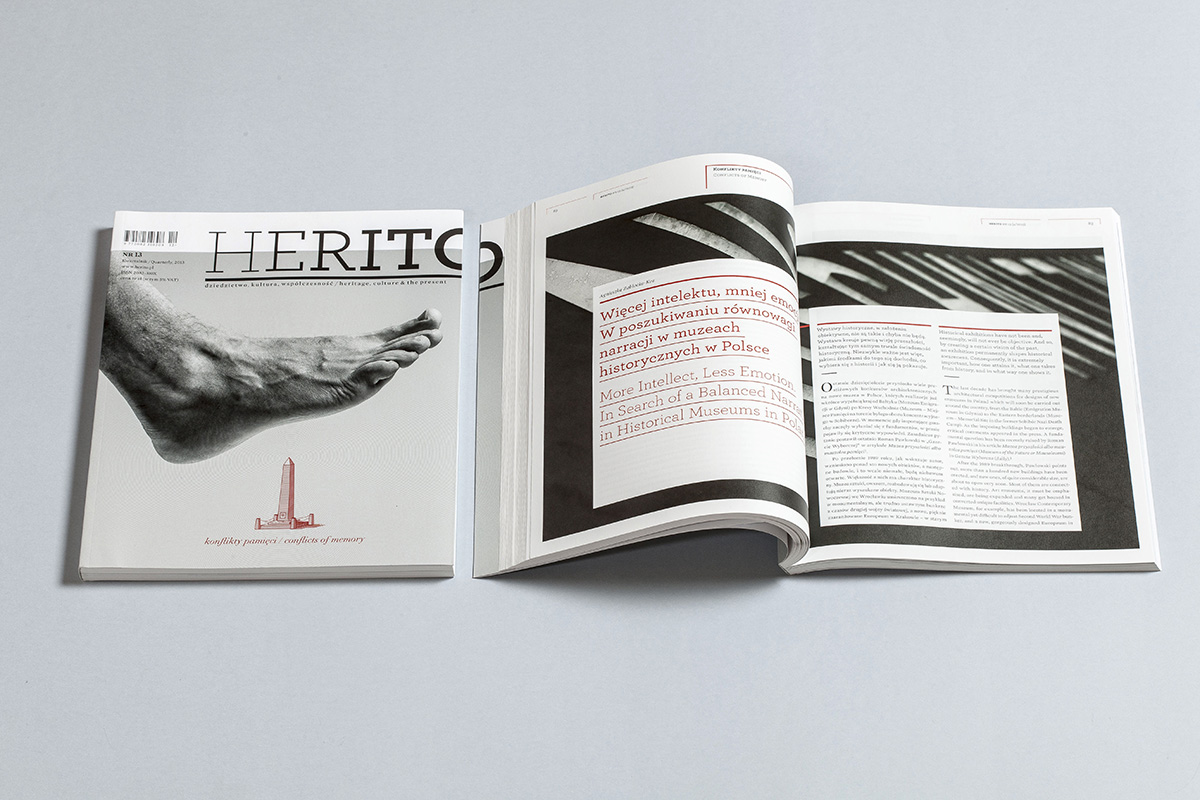Conflicts of memory belong to the key problems of the present day. It is an area debated by politicians, historians, sociologists, artists, writers, and museum experts… Protecting memory and disputing memory are often inseparable from each other. The latest issue of Herito presents comments on memory from renowned intellectuals including Robert Traba, Sharon Macdonald, Stanisław Obirek, Ewa Chojecka, Maciej Czerwiński, and Agnieszka Zabłocka-Kos.
The Gallery of the International Cultural Centre is currently holding an exhibition titled “Memory. Registers and Territories,” which depicts the problem of memory from the perspective of contemporary artworks. While such artists as Mirosław Bałka, Zuzanna Janin, Robert Kuśmirowski, Robert Maciejuk, Artur Żmijewski , and twenty-three others, use art to speak about memory, the newest issue of Herito broadens this subject matter and shifts its context. It does so by discussing 20th-century history of Yugoslavia, exhibitions created for new historical museums, post-socialist nostalgia and the complete opposite of memory – the need to forget.
“Each community devises specific modes of remembering, but also of forgetting uncomfortable facts. Ars memoriae and ars oblivionis constitute an inseparable pair. Common memory is a sphere that we reconstruct anew every day, even though people claim that the essence of their identity is unchanging. While history itself is a closed structure, memory is open both to individuals and to the collectivity. Collective memory reconstructs rather than registers the past; and memory is not necessarily explicit. The issues today include not only reclaiming memory and polyphony of memory, but also – and perhaps above all – conflicts of memory, the problem of “our memory and yours”, difficult memory, manipulation of memory, and its sacralisation, appropriation and instrumentalisation. Following this idea, in this edition of Herito we try not only to become oriented in the nature of conflicts of memory, but also to look around the landscape of memory that surrounds us, Central Europeans. For, above all, one needs to start with oneself.” Writes Jacek Purchla.
Conflicts of memory are related to individual memory – mine, yours, her/his… and to collective memory – ours, yours, theirs… “From the biological point of view, collective memory does not exist. For each social group, however, defining itself as we, a canon of references to the past is needed to create their own coherence rooted in the past and directed towards the future” – says Robert Traba, historian specialising in studies on memory. We constantly face the responsibility to remember; often we are also compelled to forget. There are tools of memory, such as museums, archives and historical books. Readers have an opportunity to read about them in the latest issue of Herito – as always, richly illustrated and with elegant layout.
The issue includes:
Robert Traba “The Necessity to Forget, or How To Cope Ars Oblivionis”
The distinguished historian, Director of The Centre for Historical Research in Berlin, writes not only about remembering, but also about suppressing and forgetting as immanent elements of memory. In his article he refers to the praxis of the post-WWII years, including legitimisation of the communist system.
Sharon Macdonald “Europe as a Memoryland”
The British anthropologist, author of the recently published book Memorylands: Heritage and Identity in Europe Today examines Europe’s “obsession” with memory. She defines it as “the memory phenomenon”. She writes about European memory schemata, about updating memory and nostalgia.
Maciej Czerwiński “Former Yugoslavia – a Topography of Collective Memory”
A brilliant description of the history of Yugoslavia from the point of view of all the sides of the conflict.
Agnieszka Zabłocka-Kos “More Intellect, Less Emotion. In Search of a Balanced Narrative in Historical Museums in Poland”
Researcher of museums and historian of architecture addresses the topical problem of historical museums and their ways of building historical narratives, which is the object of incessant political struggle.
Also not to miss in this issue:
Stanisław Obirek “On Dialogue in the Context of Conflicts of Memory”
Ewa Chojecka “Upper Silesian Conflicts Concerning Historical Memory. New Identities in Statu Nascendi”
A presentation of paintings by Josep Maria Cabané, a Catalonian artist addressing the tragic events of the 20th century.
A hitherto unpublished interview with the essayist Leopold Unger: “We Have Constructed Europe. Now We Need to Construct Europeans”
Herito quarterly is a forum for discussion of the major questions in contemporary culture, heritage and art. The point of departure for these reflections is Central Europe. The magazine is a valued participant in international debate on culture. It is a bilingual, Polish-English publication.
Herito is available in quality bookstores and newsagents, as well as in the bookstore of the ICC (Main Square 25, Krakow and the internet bookstore: www.mck.krakow.pl/bookshop )
An electronic version of Herito for mobile devices is available from Google Play and App Store in two language versions: Polish and English.
